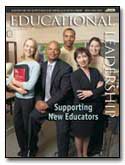The opportunity was breathtaking. The experience itself was memorable and, perhaps, life-altering. In October 2004, members of the ASCD Board of Directors and ASCD staff officers spent seven days in South Africa. In that short week, ASCD representatives visited Cape Town, Soweto Township, the University of Pretoria, Lesedi Cultural Village, schools in Johannesburg and in the surrounding areas of Free State Province and Gauteng Province, and the famous District Six Museum memorializing the struggle leading up to apartheid.
We discussed many issues with our hosts, including education reform in South Africa, the effects of HIV/AIDS as well as increasing diversity on South African schools, recent and needed social reform throughout the country, and the effects on schools of both the remnants of apartheid and a decade of democracy.
The parallels to education in other parts of the globe were easy to find. Because South Africa recognizes 11 official languages, the country's educators struggle with the challenge of teaching native speakers of multiple languages. Educators and politicians debate the need for norms and standards in education and wrestle with the new Curriculum 2005. Discussion has intensified around the question of how to determine the effectiveness of teachers and schools. School leaders are questioning whether the curriculum in higher education is relevant, while higher education professors question whether equity is possible in a country that is undergoing such rapid changes. The education system is struggling to train teachers: The number of preservice teachers is only a fraction of the number that projections show the country will soon need, and many inservice teachers lack the skills and knowledge needed to serve the population of a continually—and dramatically—changing country.
Despite these similarities to other countries, South Africa faces specific education challenges that demand the immediate attention of educators worldwide. Few countries have transformed themselves as completely as South Africa has since the end of apartheid. In its one decade of democracy, the country has struggled to balance a search for newly gained equity with a respect for the cultures of the past. We heard one lecturer who mentioned that South Africa had a “problem looking at local issues from a global perspective.” Another presenter suggested, “It's easy to say we are in favor of diversity. What's difficult is coming face-to-face with diversity.”
As we ASCD learners gained more confidence in our grasp of the country's issues, we came to better understand the struggle to overcome the effects of apartheid and to acknowledge the difference between schools termed “formerly advantaged” (all-white under apartheid) or “formerly disadvantaged” (all-black under apartheid). Learning the meaning of the safari term the “Big 5” (lion, elephant, rhinoceros, leopard, and buffalo), we applauded what South African educators called the “New Big 5”: respect, reaching out, restraint, recognition, and rebirth. We appreciated the ways in which our own cultures and workplaces tinkered with similar efforts.
But our group fell silent at the discussion of the impact of HIV/AIDS on South Africa's families, teachers, schools, culture, and future. We learned that by 2010, South Africa will have suffered two million deaths from AIDS—this in addition to the many more millions of children affected by the pandemic. We cringed at the discussion of “child-headed households,” a new census category for schools. We bristled at the truth that “the dying time has come”—a reference to the fact that people infected in the 1990s are now dying. We were speechless as we drove by tin trailers that advertised 24-hour funeral home services. We believed the speakers who told us that “whether or not we are infected, we are affected!” We knew that when we returned home to our schools and communities, we would bring with us haunting memories.
We came home. We realized that we couldn't forget. We promised to continue the relationship. Since October, ASCD has been pursuing two strategies in South Africa: building awareness of our organization and its resources by sharing membership materials with key university and ministry colleagues and exploring a collaboration with Free State Province to develop the leadership capacity of teams of educators. Our two primary goals are for South African educators and policymakers to view ASCD as a key resource in building the capacity of South African schools and for the worldwide ASCD community to learn from our South African colleagues how to build lasting change in challenging circumstances.
Our visit to South Africa was organized around the theme of the 2005 ASCD Annual Conference: “Voices of Education: Unleashing the Power to Challenge, the Passion to Lead, and the Promise to Succeed.” We learned to appreciate the power, passion, and promise of South Africa's recent past. We realized the challenges that the future holds and the leadership that will be required for the education system to prosper.
Weeks after we had all been reacclimated to our lives back home, I received a package containing a hand-embroidered jacket that I had ordered while in South Africa. I opened it and smiled at the fond memories that my purchase elicited. Suddenly, something fell out of the package onto the floor. Accompanying my purchase was a brown, crinkled paper printed with a verse. As I read it, the memories flooded back. The verse is now framed in my office, a token of our visit. Or perhaps it is an admonition for each of us as educators to keep in mind, wherever we practice our profession:Springing from the depths of African soil, they are the gifts which Great Mother Earth bestows on the land; they carry with them the hidden seeds of the future; in their genes the sorrows and delight of many generations who have gone before.What shall we leave them, the Children of Africa, as heritage? Laughter to touch the rolling hills, wisdom to choose life in all its forms, love to nurture and care for their brothers and sisters, and the inner knowing that we are all connected in the Circle of Life.Nkosi sikelela Abantwana base Afrika! God bless the Children of Africa!
